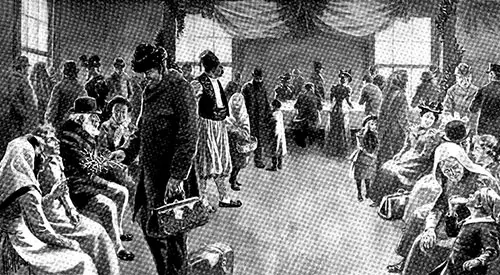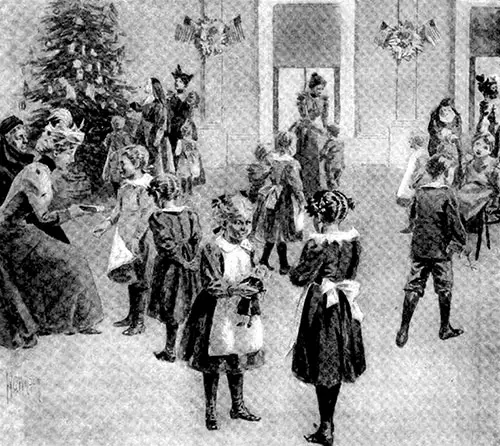Homeless Immigrants Christmas at the Barge Office - 1898

"And the Christmas of the Immigrants at the Barge Office Is Not a Bad One, After All." Drawn by W. O. Wilson. The Puritan, December 1898. GGA Image ID # 14f4df5842
Sometimes they lose all count of days, crossing the wintry sea. In the steerage one does not find silver mounted calendars. The tossing of the ship, the dread of the unknown land, the misery of seasickness, the heartache of homesickness—these drive dates from the mind.
And so, when a certain midwinter trip is over and the crowd of dazed immigrants pours into the dreary office, a cry of surprise is often heard, and an excited chorus in which one may distinguish the words, "Der Tannenbaum!" "Noel!" "Saints preserve us; it's Christmas!"
For the great country which welcomes wanderers does not forget to give them cordial greeting when Christmas sees them first upon its shores. The fir tree in the corner of the big, barren room and the ground pine twisted round the pillars are but a part of the cheer provided.
There are relatives and friends to hear some of the strangers off to their homes. At least half of the chattering, puzzled crowd is lovingly borne away, making only the more pitiful the lot of those left behind.
For these are they whom the government must send back again, or those whose relatives have neglected to come for them. All such, when their arrival falls on Christmas, are guests of the nation—and the nation is not inhospitable.
Besides the green that tells them what day it is, there is a feast provided —the typical American feast, with turkey, celery, and cranberry sauce.
When they have wondered and eaten all they can, sometimes a little German Gretchen, her heart overflowing with thanks, begins to hum "Stille Nacht."
Every one guesses that it is a Christmas hymn, and softly each one sings to himself the hymn of his own country, making a harmony, though it is but the feeling, not the time or tune, that is one.
And the Christmas of the immigrants at the barge office is not a bad one, after all.
Far up in the big city on whose borders the foreigners are being entertained, there is another pathetic group, who, like the immigrants, have come unwanted to a land where their lot is destined to be hard.
Yet the sisters who care for the foundlings—the little waifs picked up on sidewalks or left screaming in the basket waiting to receive them at the asylum door—try to make the festival of love and peace comprehensible to their charges.

“The Day When Visitors and Toys and Sweets Ani, Play Are All Theirs Without Restraint.” Drawn by W. O. Wilson. The Puritan, December 1898. GGA Image ID # 14f53c5c62
Early in the morning the dormitories where sleep those who have grown beyond the crib stage resound with song. "Carol, Christians, carol carol joyfully," pipe the little voices. And they know that this is the day of days—the day when visitors and toys and sweets and play are all theirs with no restraints.
Early in the day they are summoned to look upon the big fir tree which holds a gift for every one of them. Some of these are provided by the regular asylum fund and some from never failing Christmas philanthropists.
But the calm eyed sisters know of some that come from nameless sources, of money tucked in notes that are not signed, of dolls and toys marked for "Baby Alice" or "Little Joe," and then they know that somewhere Christmas has come to awaken conscience and remorse.
The day ends when the little blue uniformed regiment files into the chapel for vespers—all rosy and devout, full of memories of feasting and frolic—to thank Heaven that they live in a world so kind and fair.
In the body of the chapel visitors are gathered, and they listen pityingly to the thanksgiving of the children who, all unconscious of the need of pity, "carol joyfully."
Far up town, in a home overlooking the Hudson, some of the old ladies of New York spend their Christmas. They look forward to the clay for many weeks. This one's friends have invited her to dine, that one's have promised to come and spend an afternoon with her.
From early in the morning, the usually quiet place is filled with bustle and confusion. Little vanities long discarded are resurrected. This one has doubts of the lace collar laid away many years ago; that one is in a flurry over the problem presented by pink and purple ribbons for her cap; another is not sure that her black silk, relic of former grandeur, will be just the thing for her clay's outing.
The fortunate one who is invited out to dinner is ready several hours before the time set, and commiserates patronizingly with the forlorn little woman whose friends have forgotten that she is in an old ladies' home, to whom no one is coming; who is going nowhere, but who will spend her day in the stiffly decorated rooms, listening to well meant speeches by the board, joining in perfunctory hymns—all the while alone with her memories.
In all the hospitals Christmas is the children's day. The pungent fragrance of pine and fir overpowers for once the heavy odor of anesthetics. Lids that seemed too weary to be lifted the clay before, are wide open now to look upon the fairyland created by the nurses overnight. Over every cot and crib there is a wreath of green.
On every counterpane are wonders manifold. There is a little bunch of bright, prickly red and green, and the nurses tell that its name is holly. For the girls there are dolls—fine lady dolls for little invalids who have never seen in real life the beings counterfeited for them now in wax and tow.
The little girl with bandaged arm caresses her unresponsive baby with as much instinctive motherhood as though she had two arms. In the next cot a child croons happily over a shapeless rubber being.
Diminutive "nigger" dolls create delight; proud bisque ones inspire awe. And then there are picture books full of gorgeous colors and wonderful scenes, cut and pasted by thoughtful people who treasure cards and magazines to make the pleasure giving books.
The boys have gifts that appeal equally to them. There are steam engines that will run swiftly over quilts. There are books to make them forget the walls of their wards—jungle tales and desert island stories.
There are toy soldiers to marshal in battle array and to pose for favorite heroes. There are whole villages stacked with houses, animals, bright green trees, and miniature people. All these are enough to make the children forget half their aches and pains—and this is not half their Christmas fun.
Such feasts they may have if they are convalescing—such white slices of chicken, such pieces of cake, such beautiful sticks of striped candy, such heaping plates of ice cream.
And in the middle of the ward for them to gaze at all day long a fairy tree of green stretches its branches all a glitter with tinsel and gay with ribbons and candles and fruit. In the evening a bright electric star whirls about and makes them fairly ecstatic with delight.
Almost as lonely as the day of the old lady who has outlived her friends is that of the young woman who has put hers aside for what she probably calls a career.
On Christmas she bustles into the favorite hostelry of the independent woman—the Margaret Louise Home. She does not discard even for this occasion her air of having only a few minutes for so frivolous an occupation as dining.
But at the table, even the most conspicuously businesslike of all the tribe gradually loses her pride of position. She looks, not with unmitigated satisfaction, at the long tables full of others of her kind. The gleam of silver and the white napery does not afford complete esthetic pleasure any more than do the viands, attractive they are, give her an appetite.
The green hangings she has passed in the sunny parlor make her homesick, and perhaps in all New York there is no more depressing sight than the room full of healthy, bright, well dressed, well fed, lonely women gathered together away from their kinsfolk.
One has a different feeling about the tramp who has forgotten that he ever had a home and perhaps never did have one worthy the name. When he slouches into the mission restaurants, his ragged hat pulled low over his eyes, his frayed collar turned up about his ears, unkempt and dirty, one feels grateful that in the big city there is some Christmas cheer for even the most forlorn.
Along the waterside and in the narrow, crowded streets of the slums, various missions are established for this day only, restaurants whose open doors mean a welcome to all the outcasts.
For the last three years some five hundred pounds of turkey and three hundred of chicken have been provided for the five hundred odd prisoners who happened to be in the Tombs prison at the time. All the jails make equally generous provision for their inmates.
Prison discipline is relaxed for the day. The women are permitted the freedom of the corridors all day, and the men are allowed out of their cells until after the noonday dinner.
The dinner is a special one—not the customary prison stews and potatoes, but one that holds the conventional turkey and cranberry sauce.
The entertainment is provided by the prison missionaries. It would not seem very cheerful, perhaps, to those free to choose their own diversions. But to those to whom each day brings the same dull routine of work or discipline, the Bible reading and the praying and the singing of hymns that accompany.
Christmas Day are more than a break in the awful monotony; how much more one may guess who knows that every Christmas eve a small band of reclaimed toughs journey up to a certain house on Madison Square to sing beneath its windows the songs of peace and good will its gracious mistress sang to them in prison long ago.
Pauline Stanton, "The Christmas of the Homeless," in The Puritan, Vol. IV, No. 3, December 1898, pp. 326-330
